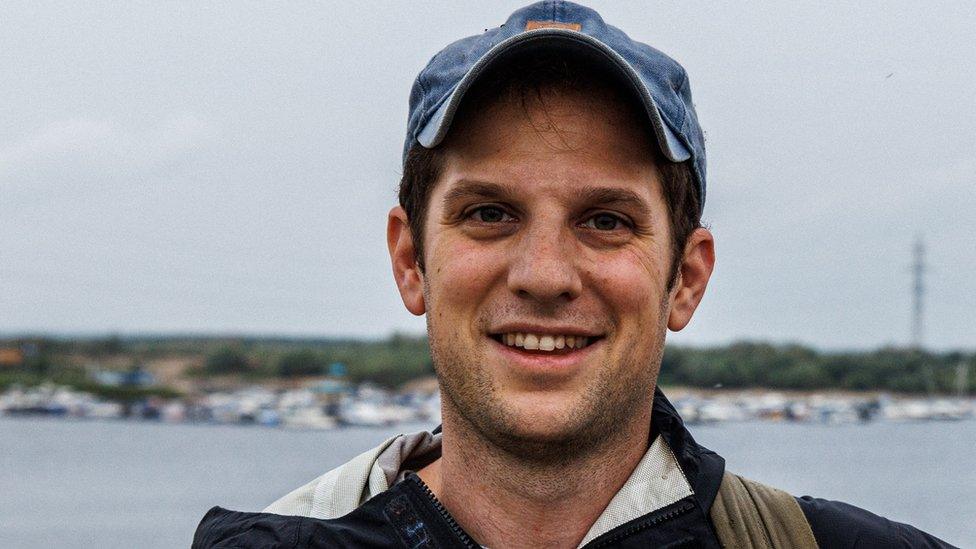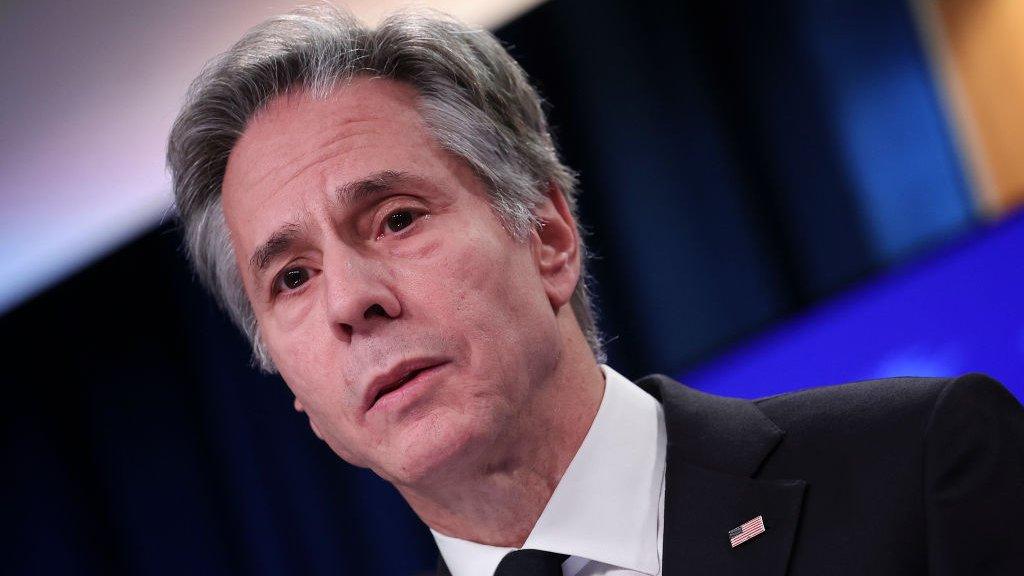Evan Gershkovich: Colleagues leave place for jailed WSJ reporter at Passover
- Published

The Jewish holiday of Passover is rich with traditions. This year, some celebrants are adding one more, as part of a fight to free a US journalist detained by Russian authorities.
Jewish people are setting an empty place at their traditional Passover meal, known as Seder, in honour of Wall Street Journal correspondent Evan Gershkovich, who Russian agents arrested in the city of Yekaterinburg in late March.
Mr Gershkovich is the son of Jewish parents who fled the Soviet Union for America. His arrest came days before the start of Passover, which commemorates the biblical story of the Jewish Exodus from ancient Egypt.
Passover's primary theme is that of liberation, and Mr Gershkovich's colleagues and supporters have seized the chance to call for his freedom in a social media campaign.
"For all my Jews out there, please join us in demanding the release of WSJ journalist Evan Gershkovich, as we celebrate freedom this Passover," tweeted Jared Malsin, an Istanbul-based reporter for the Wall Street Journal. "Set a place for Evan at your Seder table."
The image also features the slogan -- "Let Evan go!" -- an echo of Moses' command to Pharaoh to "let my people go" in the Old Testament telling of the Exodus.
Allow X content?
This article contains content provided by X. We ask for your permission before anything is loaded, as they may be using cookies and other technologies. You may want to read X’s cookie policy, external and privacy policy, external before accepting. To view this content choose ‘accept and continue’.
Passover lasts for eight days, and the first two nights are celebrated with the traditional Seder meal. On Wednesday night, the first night of the holiday, several journalists and Jewish supporters of Mr Gershkovich shared images of their table settings left empty in his honour.
Using the Passover Seder to support Jewish people in danger has a long history in the United States. The campaign for Mr Gershkovich echoes an effort to support Jewish people facing persecution in the Soviet Union, said Hasia Diner, director of the Goldstien-Goren Center for American Jewish History.
Starting in the mid-1980s, local Jewish community councils in America and other organisations distributed materials from the Union of Councils for Soviet Jews, which supported members of the community who were trying to flee, or faced imprisonment, in the Soviet Union.
"They produced a reading to be read at Seder tables. They provided the names of specific Refusniks to be invoked," Ms Diner said, referring to people, primarily Jews, that the Soviet Union barred from emigration.
Allow X content?
This article contains content provided by X. We ask for your permission before anything is loaded, as they may be using cookies and other technologies. You may want to read X’s cookie policy, external and privacy policy, external before accepting. To view this content choose ‘accept and continue’.
During the Soviet era, hundreds of thousands of Jewish people ultimately emigrated from the USSR to the United States, Israel, and other countries to escape religious persecution. Mr Gershkovich's parents themselves are Soviet exiles who settled in New Jersey, according to the Wall Street Journal.
The Temple Menorah synagogue in Miami, Florida placed a photo of Mr Gershkovich on the sanctuary's bimah, or altar, the prominent place from which rabbis lead the congregation.
Wall Street Journal editor Shayndi Raice shared a photo of the synagogue's tribute on Twitter, writing, "I'm in tears."
Mr Gershkovich's arrest takes place against the backdrop of a deteriorating relationship between Russia and the US due to the invasion of Ukraine. Russia has accused the 31-year-old reporter of espionage. The Wall Street Journal, the White House, and top US government officials vehemently deny the allegation and call for his immediate release.
"Evan is a member of the free press who right up until he was arrested was engaged in newsgathering," Emma Tucker, editor in chief of the Wall Street Journal, wrote in a statement. "Any suggestions otherwise are false."
He is being held at Moscow's Lefortovo prison, and only recently gained access to a lawyer after several days of detention. The Wall Street Journal reported on Thursday that a Russian court would hear an appeal from his lawyers.
"May he have his freedom soon," tweeted Josh Glancy, a reporter at the Sunday Times, who left a seat empty for Mr Gershkovich at his Seder table.
- Published30 March 2023

- Published3 April 2023
